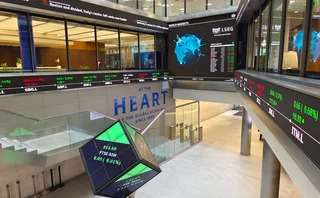
Precious metals house of the year: BNP Paribas
Energy Risk Awards 2018: French bank adds silver to its expanding China presence

One of the success stories of BNP Paribas’s commodities franchise in recent years has been the growth of its precious metals business. Last year a number of unique transactions exemplified the bank’s commitment to this space. While it is a global business with gold trading headquartered in London and operating also out of New York, it is in Asia that the bank has seen the most substantial growth.
“Our precious metals business operates globally and across client types, but strategically we have looked to build out our activities in Asia in recent years, with a particular focus on access to the Chinese market where we now offer trading of both gold and silver,” says Mikko Rusi, global head of metals and head of Asia-Pacific commodity derivatives at BNP Paribas. “We are not yet anywhere near the peak of our activities in China as the market has huge potential.”
The bank’s client base in precious metals spans banks, corporates, hedge funds and official institutions, such as central banks, and it has proven its ability to combine financing with sophisticated risk management on multiple occasions. While Rusi believes market participants are less inclined to hedge the price of gold than they might have been in the past, given its relatively low volatility, the bank continues to offer hedging services wherever appropriate.
Following a concerted push into Asia in recent years, BNP Paribas increased its client base in the region by a double-digit percentage last year, and Rusi sees a wealth of further opportunities emanating from China. He relocated from London to Singapore in 2016 to push the expansion of the metals business, but while it has always been known for its strengths in base metals, efforts to grow in precious metals have been boosted by the recent focus on China.
China has really opened up to the trading of precious metals over the last 15 years, and so we wanted to make sure we are part of this development by setting up the necessary infrastructure and personnel to support onshore trading
Mikko Rusi, BNP Paribas
“As the world’s largest producer of gold, China has really opened up to the trading of precious metals over the last 15 years, and so we wanted to make sure we are part of this development by setting up the necessary infrastructure and personnel to support onshore trading,” he explains.
Having obtained the necessary regulatory approvals, BNP Paribas last year began offering gold hedging and trading onshore through its subsidiary, BNP Paribas China. It can now support bilateral gold trading on the Shanghai Gold Exchange as well as physical spot trading in silver on the Shanghai Futures Exchange (SHFE).
Given onshore restrictions that prevent banks from trading directly on the futures exchanges, the bank established an onshore corporate entity, BNP Paribas Commodities Trading Shanghai, which allows it to support local corporates and trading companies seeking to sell SHFE deliverable silver. This was one of a number of unique challenges that had to be overcome to deliver access to Chinese precious metals.
“Precious metals in China trade under different documentation and systems from Europe, so we had to build both front- and back-office functions to cover trading, accounting and compliance, as well as obtaining regulatory approval to operate onshore. Given the scale of the project, we had to be sure the Chinese market would continue to grow in the long term,” Rusi says.
Beyond China, BNP Paribas has proved its mettle in a number of recent transactions in Australia. In one example, it worked in a syndicate of three banks to restructure an Australian mining company’s hedge book, which consisted of a combination of deferred spot and forward contracts. The restructure, which amounted to a notional value of roughly $340 million, allowed the company to better match the mine’s anticipated production and avoid having to pay to unwind out-of-the-money deferred spot contracts.
“The mining company’s hedge book was too front-loaded, so we worked with them to come up with a more appropriate hedge profile that suited its production and cashflow plans going forward. By novating the old positions and restructuring the hedge, we have allowed the company to operate more freely and meet its objectives,” Rusi explains.
In a more traditional financing transaction, BNP Paribas was one of three managing lead arrangers to support the development of a gold mine in western Australia. Following the arrangement of a five-year A$150 million ($113) construction loan and cost overrun facility in the first quarter of 2017, the first gold was expected to be mined earlier this year.
However, it was the integrated discretionary hedging service that made the transaction stand out. Lending banks often require companies to put on hedges as a condition of the loan but, in this case, the gold exploration company chose to do so voluntarily. BNP Paribas committed credit lines to support discretionary hedging up to the maturity of the facility in December 2021, and the first hedge was executed in mid-2017. Structurally, it was ranked pari passu with the loan, which provided the bank with a level of comfort around the credit risk of the hedge, Rusi says.
“Although in this particular case there was no mandate to have a hedge in place as part of the loan, because it was a strong project with low production costs, we engaged with the management of the company to present the benefits of hedging. When the price of gold spiked last year, the client took the opportunity to enter into hedges on a discretionary basis,” Rusi says.
Only users who have a paid subscription or are part of a corporate subscription are able to print or copy content.
To access these options, along with all other subscription benefits, please contact info@risk.net or view our subscription options here: http://subscriptions.risk.net/subscribe
You are currently unable to print this content. Please contact info@risk.net to find out more.
You are currently unable to copy this content. Please contact info@risk.net to find out more.
Copyright Infopro Digital Limited. All rights reserved.
As outlined in our terms and conditions, https://www.infopro-digital.com/terms-and-conditions/subscriptions/ (point 2.4), printing is limited to a single copy.
If you would like to purchase additional rights please email info@risk.net
Copyright Infopro Digital Limited. All rights reserved.
You may share this content using our article tools. As outlined in our terms and conditions, https://www.infopro-digital.com/terms-and-conditions/subscriptions/ (clause 2.4), an Authorised User may only make one copy of the materials for their own personal use. You must also comply with the restrictions in clause 2.5.
If you would like to purchase additional rights please email info@risk.net
More on Awards
Clearing house of the year: LCH
Risk Awards 2025: LCH outshines rivals in its commitment to innovation and co-operation with clearing members
Best use of machine learning/AI: CompatibL
CompatibL’s groundbreaking use of LLMs for automated trade entry earned the Best use of machine learning/AI award at the 2025 Risk Markets Technology Awards, redefining speed and reliability in what-if analytics
Markets Technology Awards 2025 winners’ review
Vendors jockeying for position in this year’s MTAs, as banks and regulators take aim at counterparty blind spots
Equity derivatives house of the year: Bank of America
Risk Awards 2025: Bank gains plaudits – and profits – with enhanced product range, including new variants of short-vol structures and equity dispersion
Law firm of the year: Linklaters
Risk Awards 2025: Law firm’s work helped buttress markets for credit derivatives, clearing and digital assets
Derivatives house of the year: UBS
Risk Awards 2025: Mega-merger expected to add $1 billion to markets revenues, via 30 integration projects
Interest rate derivatives house of the year: JP Morgan
Risk Awards 2025: Steepener hedges and Spire novations helped clients navigate shifting rates regime
Currency derivatives house of the year: UBS
Risk Awards 2025: Access to wealth management client base helped Swiss bank to recycle volatility and provide accurate pricing for a range of FX structures







